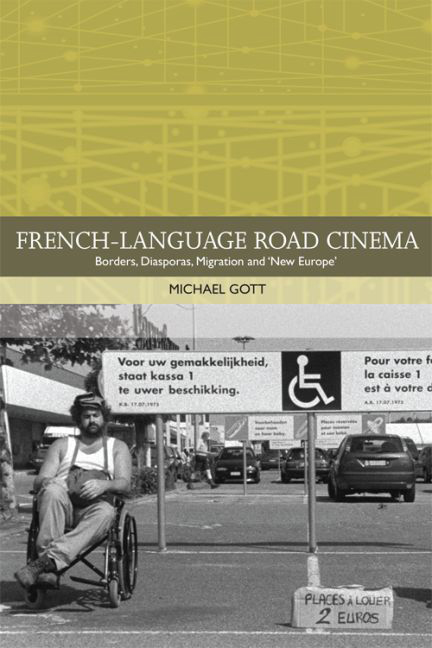Book contents
- Frontmatter
- Contents
- Acknowledgements
- List of Illustrations
- Traditions in World Cinema
- Introduction
- 1 Mapping the Hybrid European Road: French Connections, European Traditions and American Influence?
- 2 Remapping the European Road
- 3 Cowboys, Icebergs, Anarchists and Toreadors: The Paradoxes and Possibilities of the Francophone Belgian Road Cinema
- 4 Travelling Beyond the National: Mobile Citizenship and Flexible Identities in French-language Return Road Movies
- 5 The End of the Road? Dark Routes and Urban Passageways
- Conclusion
- Works Cited
- Index
2 - Remapping the European Road
Published online by Cambridge University Press: 12 September 2017
- Frontmatter
- Contents
- Acknowledgements
- List of Illustrations
- Traditions in World Cinema
- Introduction
- 1 Mapping the Hybrid European Road: French Connections, European Traditions and American Influence?
- 2 Remapping the European Road
- 3 Cowboys, Icebergs, Anarchists and Toreadors: The Paradoxes and Possibilities of the Francophone Belgian Road Cinema
- 4 Travelling Beyond the National: Mobile Citizenship and Flexible Identities in French-language Return Road Movies
- 5 The End of the Road? Dark Routes and Urban Passageways
- Conclusion
- Works Cited
- Index
Summary
Films covered: Le grand voyage (Ismael Ferroukhi, 2004, France/Morocco/ Bulgaria/Turkey), Rendez-vous à Kiruna (Anna Novion, 2012, France), Saint- Jacques … la Mecque (Colline Serreau, 2005, France), Torpedo (Matthieu Donck, 2012, Belgium/France) and La vraie vie est ailleurs (Frédéric Choffat, 2006, Switzerland)
This chapter moves on to contemporary cinema to examine a representative sample of films made since 2004 that introduce the geographic range, key thematic and cultural issues, and most typical modes of transport employed in French-language European road cinema. As I argued in the introduction, road movies – a breed of travel cinema more traditionally associated with the vast open spaces of North America – are presently flourishing in Europe because they articulate a desire to come to terms with new relationships to space and identity. In this chapter I will return once again to the question of the road movie's geographic particularities. Unlike in Chapter 1, which explored inter-connected points of influence and exchange, this chapter will aim to delineate the cultural and artistic specificity of contemporary European road cinema. This exploration of the characteristics of French-language European road films encompasses two overlapping angles of approach: one that considers a number of key thematic issues and the other that investigates the rich variety of modes of conveyance or travel harnessed in European road cinema. In other words, I will use the following case studies to examine the primary motivations for being on the road in French-language Europe (and Europe in general) and the ways in which the various modes of transit involved are represented and how the techniques and practicalities affect the issue of representation.
In the following I will assess five diverse films that employ the road format to respond to the Europeanisation of economies and identity formulations: Rendez-vous à Kiruna (Anna Novion, 2012, France), Le grand voyage (Ismael Ferroukhi, 2004, France/Morocco/Bulgaria/Turkey), Torpedo (Matthieu Donck, 2012, Belgium/France), Saint-Jacques … la Mecque (Colline Serreau, 2005, France) and La vraie vie est ailleurs (Frédéric Choffat, 2006, Switzerland). The process that Randall Halle calls ‘Europeanization’ (2014) has led to new ways of conceiving of identities outside and in complement to the nation.
- Type
- Chapter
- Information
- French-language Road CinemaBorders, Diasporas, Migration and 'New Europe', pp. 51 - 85Publisher: Edinburgh University PressPrint publication year: 2016



